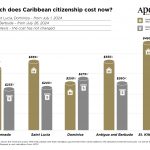Table of Contents
- Citizenship Through Investment: A Viable Option
- Comparing the Advantages of Residency and Citizenship
Understanding the Distinctions: Resident vs Citizen
The terms ‘resident’ and ‘citizen’ are often used interchangeably, but they hold different implications, particularly when it comes to legal status and rights. While both afford individuals a place within a country’s social tapestry, the specific rights, obligations, and long-term implications of each vary significantly.
A resident is generally someone who lives in a particular place but does not have all the rights and privileges that come with citizenship. In contrast, a citizen is fully integrated into the social and political fabric of a country, with a complete set of rights and responsibilities.
Legal Implications of Status
A resident, especially in the context of someone living in a country of which they are not a citizen, often has certain restrictions. For example, they may need to renew visas or permits periodically, and their status can be more precarious if they run afoul of the law.
By contrast, citizens enjoy a more secure status. They have the right to vote, to stand for public office, and are protected by their nation’s laws and policies to a fuller extent. Citizenship also typically grants one the right to enter and leave the country at will, without the need for visas or re-entry permits.
Pathways to Citizenship and Its Benefits
The journey to citizenship often involves a process called naturalization, where a resident must meet certain criteria before applying. Criteria can include a period of residence, language proficiency, knowledge of the country’s history and government, and good moral character.
Once a resident becomes a citizen, they unlock a suite of benefits. They can participate in the democratic process, gain access to certain jobs in government, and ensure their ability to remain in the country indefinitely. These benefits consolidate their bond with the host nation, often reflecting a deep personal commitment to its future.
Economic Opportunities for Residents and Citizens
Residents may have the right to work and live in a country, but they may not have the same access to social welfare programs as citizens. The ability to own property or engage in certain businesses can also differ. For instance, some countries restrict land ownership to citizens only.
Citizenship opens doors to economic advantages such as eligibility for government contracts, voting rights on economic policies, and certain tax benefits. From our experience at Apex Capital Partners, many clients pursue citizenship to enhance their economic prospects and to solidify the financial futures of themselves and their families.
Social and Cultural Integration
Anecdotal evidence suggests that residents can sometimes feel like outsiders, unable to fully participate in the life of their adopted country. On the other hand, becoming a citizen is often a transformative experience, allowing for a deeper connection with the community and nation.
Citizens are more likely to be invested in the long-term future of their country, from infrastructure projects to educational initiatives. They can have a say in elections and referendums, influencing the policies that shape the nation’s path forward.
Residency Programs as a Step Toward Citizenship
Many of our clients at Apex Capital Partners view residency programs as a stepping stone towards obtaining full citizenship. These programs, often seen as investments in the future, allow individuals and their families to start integrating into society and the economy.
There are various residency-by-investment programs around the globe, each with its set of criteria and advantages. Real estate investments, job creation, and capital investments are common means through which residency and eventually citizenship can be attained.
Citizenship Through Investment: A Viable Option
Countries like Saint Kitts and Nevis and Grenada offer the option of obtaining citizenship through investment. This can be an attractive route for those with the means to invest significantly in another country’s economy.
Our role at Apex Capital Partners includes assisting high-net-worth individuals in navigating these options. We provide tailored advice, ensuring that the route to citizenship aligns not just with our clients’ financial goals, but also with their personal aspirations and values.
Comparing the Advantages of Residency and Citizenship
When our clients weigh the options, we discuss the broad spectrum of advantages. A resident visa can offer the freedom to live and work abroad, which is particularly attractive to digital nomads and international businessmen. Meanwhile, citizenship presents a permanent sense of belonging and continuity, which can be crucial for those looking to establish generational ties or seeking political stability.
Residents and citizens alike contribute to the nation’s vibrancy and diversity, but the level of contribution and the benefits thereof vary significantly. Understanding the nuances of resident vs citizen status is crucial for informed decision-making in our clients’ international ventures.
Tailored Immigration Strategies
At Apex Capital Partners, we don’t just process paperwork; we craft bespoke immigration strategies. Whether it’s an entrepreneur looking to expand their business horizons or families seeking a safe haven, we take into account cultural, educational, and lifestyle goals.
Choosing between residency and citizenship involves a mosaic of considerations. Each client’s story is unique, and we listen attentively to provide the most coherent and beneficial advice.
The Ethos of Citizenship
While residency might be a matter of convenience, citizenship is a pact with a nation, symbolizing a profound relationship. It involves not just rights, but duties to a community and a land. And in the larger picture, it is about shaping the legacy of a nation that will be home to future generations.
For many of our clients, acquiring citizenship is a statement of commitment and a strategic choice. It reflects a deliberate desire to contribute to and benefit from the social, economic, and political life of a nation. At Apex Capital Partners, we honor and facilitate that choice.
In Conclusion: Resident vs Citizen
In our decades of experience at Apex Capital Partners, we’ve observed the evolution of the resident vs citizen debate. It’s clear that while residency can offer a comfortable and flexible lifestyle, citizenship is about planting roots and participating fully in a nation’s destiny.
For anyone considering these paths, we recommend a thorough analysis of your long-term objectives, personal circumstances, and the political climate of the potential host country. As your advisors, we’re here to illuminate the path, whether it’s a journey towards residency or the pursuit of full citizenship.
The resident vs citizen conversation is about more than semantics–it’s about making life-changing decisions that will affect not just the individual but the generations to follow. And as professionals, we are committed to guiding our clients through every step of this significant life journey.
What’s the difference between a resident and a citizen?
At Apex Capital Partners, we understand that the distinction between ‘resident’ and ‘citizen’ is nuanced and vital for informed decision-making concerning immigration and citizenship. A resident is someone who lives in a country for a certain period, and their rights to work, study, or live there are often tied to specific visas or permits. Citizenship, on the other hand, is a permanent legal status confirming an individual’s full membership in a country’s political and social community, with all the associated rights and responsibilities, such as voting and holding public office.
Can you be a resident but not a citizen?
Absolutely. Many of our clients at Apex Capital Partners start their journey as a resident in a new country, often through programs that allow them to invest or work there. However, they do not automatically acquire citizenship status. For instance, a U.S. green card holder is a resident who has many rights, like working and living in the U.S. indefinitely, but lacks key citizenship rights like voting or a U.S. passport until they go through the naturalization process.
Are U.S. citizens and residents the same?
No, they are not the same. While all U.S. citizens are technically residents, not all residents are citizens. U.S. citizens have an inalienable right to live in the United States, participate in elections, and receive U.S. government protection abroad. Permanent residents, or green card holders, remain citizens of another country and, while they can live and work in the U.S., they cannot vote in federal elections and their status can be revoked under certain conditions.
Is country of residence the same as citizenship?
The country of residence refers to where an individual lives at present, which could differ from their country of citizenship. Citizenship is linked to an individual’s legal identity and nationality, often determined by birth, descent, or naturalization. In practice, someone can be a long-term resident in one country but still retain citizenship of another, especially in cases where dual citizenship is not permitted or sought.
How do the benefits of citizenship typically outweigh those of residency?
While residency can offer significant advantages, such as the ability to live and work in a new country, citizenship is generally viewed as a step further. As advisors at Apex Capital Partners, we’ve seen that citizenship provides our clients with a stronger sense of security and belonging. The assurance that they cannot be deported and have the right to vote and obtain a passport from the host country often outweighs the flexibility that comes with residency. Moreover, citizenship can be passed down to descendants, ensuring a legacy and stable future for our clients’ families. From an investment perspective, citizenship may open up opportunities that are not available to residents, including certain tax advantages and access to government contracts. So, when one of our clients is weighing the options, we’re there to lay out these benefits clearly, helping them choose the path that aligns with their long-term goals and values.
Resources
-
U.S. Citizenship and Immigration Services (USCIS): Details about U.S. immigration policies, including visas, green cards, and the naturalization process.
https://www.uscis.gov/ -
Department of Homeland Security: Offers resources on legal residency and the rights and responsibilities of U.S. citizens.
https://www.dhs.gov/ -
Internal Revenue Service (IRS): Information on tax responsibilities for residents and citizens, including potential benefits and obligations.
https://www.irs.gov/ -
Bureau of Consular Affairs, U.S. Department of State: Provides information on the diversity visa program, international travel, and acquiring U.S. citizenship.
https://travel.state.gov/ -
United Nations Department of Economic and Social Affairs (UN DESA): Offers a global perspective on migration, residency, and citizenship issues.
https://www.un.org/development/desa/en/ -
Migration Policy Institute: An independent, nonpartisan think tank that provides analysis and evaluation of immigration and integration policies around the world.
https://www.migrationpolicy.org/ -
The Office of Refugee Resettlement (ORR): Offers resources for refugees and asylum-seekers to integrate into U.S. society, which may include pathways to residency and citizenship.
https://www.acf.hhs.gov/orr -
Library of Congress: A comprehensive research resource providing legal information on citizenship laws, including historical and current statutes.
https://www.loc.gov/ -
National Immigration Forum: Advocacy organization that promotes the value of immigrants and immigration, providing resources that explain residency and citizenship concepts.
https://immigrationforum.org/ -
United States Election Assistance Commission: Information about the rights of citizens to participate in elections and the electoral process.
https://www.eac.gov/



